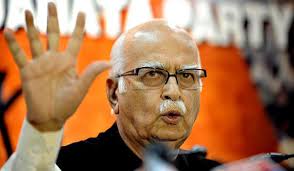Ahmedabad, Feb 28: A day after BJP's first list of candidates for the Lok Sabha polls was declared, veteran BJP leader L K Advani today expressed interest to contest elections from his current constituency, Gandhinagar.
"The first list of the candidates has been declared yesterday in which my name is not there. I have come here today to Gandhinagar to participate in a vigilance committee meeting, which clearly shows that I am interested. But party will take a final decision," Advani told reporters in response to a query.
A five-time MP from Gandhinagar, Advani was earlier offered a Rajya Sabha seat by his party but declined to enter the house of elders, choosing to continue in electoral politics.Advani has remained unbeaten from his Gandhinagar seat five times in 1991, 1998, 1999, 2004 and 2009. In the 2009 elections, when he was BJP's prime ministerial candidate, Advani won the hustings with the margin of 1.21 lakh votes defeating his nearest rival Suresh Patel of Congress.
However, things have changed between 2009 and 2014 for the 87-year-old leader, due to his posturing against Gujarat Chief Minister Narendra Modi when the latter was declared as the prime ministerial candidate,though he gradually reconciled to the fact and then praised the BJP strongman time and again.
Many senior members did not make it in the first list of candidates declared by the BJP yesterday, though leaders like Nitin Gadkari and Gopinath Munde found a place in it.
The Gandhinagar seat is considered to be one of the safest seats for the BJP due to large urban areas of Ahmedabad city also being part of the constituency where the party has a big following. Modi is yet to decide on which seat will he fight elections from the state, party sources said.
Advani further told the media that, "after the emergency as the Congress received a drubbing, this time also that party will face poll reverses. I had earlier said in one of my blogposts that I would not be surprised if the ruling party will not reach three digits."
He expressed hope that BJP will gain maximum seats in the country but stayed away from giving any figure saying that it depends upon the people of the country.Advani today participated in a district vigilance committee meeting related to his constituency here.






Comments
Add new comment